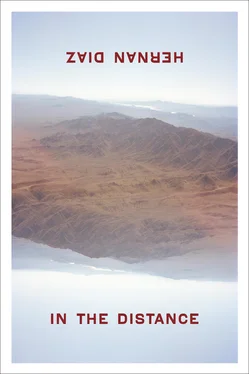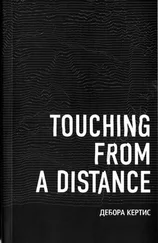Moving through the throbbing desert was like sinking into the state of trance immediately preceding sleep, where consciousness summons up all its remaining strength only to register the moment of its own dissolution. All that could be heard was the thin earth—rock pulverized through the seasons, bones milled by the elements, ashes scattered like a whisper over the plains—being further ground under the hooves. Soon, this sound became part of the silence. Håkan often cleared his throat to make sure he had not gone deaf. Above the hard shallowness of the desert, the unkind skies and the minuscule sun—a dense, sharp dot.
And yet, despite its unbending sameness, the desert was now entirely different in Håkan’s eyes. From the compass warming in his pocket, invisible beams radiated in every cardinal direction. The plains were no longer blank but traversed by lines of certainty, as solid and unquestionable as avenues and thoroughfares. Knowing where he was going, having the assurance of finding the line of emigrants beyond the ring of the horizon, being able to build a fire and cook proper food on it, hearing the water lap in the vats with each of the burro’s steps, sensing the weight of his full purse in his pocket, feeling the desert was not such a foreign place anymore—all these things and impressions turned the plains into an actual territory that could be traversed and exited instead of a suffocating void from which everything, including space itself, had been drained.
No change in Håkan’s circumstances, however, was as meaningful as owning a horse. On his horse, his very own horse, he had ascended to an order high above most men—nobody in Sweden, not even the most powerful person he had ever met, the estate manager who collected the fee from his father, owned a horse. That Pingo—for such, according to Antim, was the horse’s name—was one of the somewhat sickly ponies the plunderers had left behind, and that he had neither saddle nor bridle (instead, looped around his jaw, was a cord made from hide) was of no importance to him. He had become larger and freer. He felt, maybe for the first time in his life, proud. It was of no consequence that out in the desert nobody could witness his ennobled condition. His satisfaction required no spectators. Still, there was one pair of eyes he did miss. If Linus could only see him, riding through the grasslands on his bay roan—and with a burro in tow! Within his limited means, Håkan spoiled Pingo as much as possible. He always made sure he got enough rest and brushed him with a piece of rough canvas several times a day. He was willing to forgo his own share of water if he sensed the horse was too thirsty. In return, Pingo seldom gave Håkan any trouble. He was a docile animal, except when his gluttony got the better of him. Whenever the thickset pony spotted a somewhat greener bush, he would head straight for it, regardless of how vigorously Håkan pulled the reins, and only when all the lower leaves—the smaller and tenderer ones—had been devoured, would Pingo notice the tug of the rope. To make sure he had caught every single scrap, he would snort on the sand, dig in, and grope for the remainders with his lips. Once Pingo was sure there was nothing else to nibble on, he would lift his head and let Håkan regain control over their course. Eventually, seeing how much pleasure Pingo got from his feasts under the thickets (and always being eager to please his horse in any way possible), Håkan ended up indulging him every time.
A few days after their departure, Pingo got diarrhea. Suspecting the leaves were the cause of the horse’s illness, Håkan tried to keep him from eating them. But no matter how hard he pulled his head away from the thickets, Pingo would still suck the creeping leaves out of the sand. The pony got worse. Hoping to replicate the symptoms in himself, Håkan plucked a handful of leaves from the bottom of the brush and ate them. They were bitter and rubbery, like small dead tongues. He waited. Nothing happened. Three or four more days went by, and Pingo lost considerable weight. His hindquarters stuck out from his emaciated body. His behavior changed, too. He would stretch out, as if wanting to urinate, and remain in that position for a long time, then paw at the ground, and finally lie down and roll, with no consideration for the rider, who—after having nearly been crushed a few times—had learned to dismount with a jump at the first sign of these fits. In the end, Pingo was too sick to be mounted, and Håkan led him by the reins when he was able to move at all. He was completely puzzled by the animal’s condition. He felt the horse’s abdomen repeatedly without finding anything strange. And yet, it was clear that Pingo was dying. Then, one morning, overcome by despair after a fruitless examination, Håkan put his head to the horse’s midline in a loving rather than a clinical way. He heard a rustling sound, the lull of waves rolling in and out of a sandy beach. He pressed his ear closer to Pingo’s belly. A peaceful shore. The rushing whisper of sand in the surf. A placid seashore in his horse’s entrails. He pushed hard into the animal’s lower abdomen with his fist and once again put his ear to his side. The murmuring sand stream grew louder. Håkan emptied out a leather sack and, for the rest of the day, walked behind his horse. Late in the afternoon, Pingo finally evacuated his bowels, and Håkan collected a specimen with his sack. After carefully examining the manure without arriving at a conclusion, he filled the sack halfway with water, tied it shut, shook it, and let the contents settle. A few moments later, he stuck his hand in, careful not to disturb the liquid, and reached to the bottom. There was a thick layer of sand. Over the next day, Håkan repeated the test several times, always with the same result. He concluded that his horse had ingested inordinate amounts of dust while foraging for the tender leaves under the thickets. By now, Pingo was in severe pain. Håkan could see no other solution than to cut the horse’s abdomen open, make an incision into the large intestine, rinse out the sand, and then stitch it all back together. Performing such an operation unassisted and with limited instruments was, Håkan knew, fraught with danger, and Pingo’s chance of surviving this rudimentary procedure was slim. But he also knew that if he did nothing, the colic would kill the pony in a short time.
At dawn (he wanted to make sure he would have all the light he needed), Håkan gave Pingo several drops of Lorimer’s sedative tincture with a sackful of tender leaves. Soon the horse’s eyes turned narrower and blacker. He seemed to be squinting inward. Then he started showing his teeth to the desert. Even though his hind legs became wobbly, Pingo managed to walk away. He could not be stopped—he did not feel the pull of the rope, and he even dragged Håkan, who was hanging off his neck, digging his heels into the ground. Pingo cackled joylessly like an old hen or a tired witch. Kea, kea, kea, kea. Håkan panted. The burro looked at them, calmly surprised at their lack of decorum. Pingo sat down, staring nearsightedly into the void. Håkan tried to get him back on his feet with gentle words. Suddenly, as if lashed by an invisible whip, the horse got up and resumed his erratic march. Kea, kea, kea, kea. Once again, Håkan clung to the pony’s neck. The horse’s strength seemed to increase with his disorientation. The burro had become a speck near the horizon. Had they gone that far or was the burro walking the opposite way? Håkan managed to give Pingo a few more drops of the draft. The gelatinous legs finally melted, and the horse collapsed on his side. Just in case, Håkan tied up the pony’s feet and then ran back toward the burro. It had not moved.
Once back by his horse with his donkey and his equipment, Håkan laid out a waxed canvas tarp, boiled his instruments in the murky water (humming, like the short-haired man), washed his hands as best he could, and took all his clothes off. After making a large cut into the pony’s abdomen, he had no trouble finding the large colon. In fact, it was much bigger than he had ever imagined—thicker than a human thigh. He stuck his arm shoulder-deep into the horse’s belly, trying to go around the intestine and lift it out, but it was too heavy and slippery. Additionally, it was apparent that the tissue was extremely delicate and that it would tear if handled brusquely. His body was soon covered in sweat, blood, and viscous fluids. After gently wrestling with that colossal snake, he managed to withdraw the most movable part of the large colon from the horse’s abdomen. The heavy bowel hung over the animal’s frame and poured over onto the tarp. He made an incision the length of his hand and flushed the contents. Pingo had swallowed an enormous amount of sand. Håkan rinsed the intestine clean, almost depleting their water reserve. Then he sutured the colon and reset it in the horse. It was remarkably lighter now that the sand had been cleaned out, and he had little trouble putting the organ back in place.
Читать дальше












